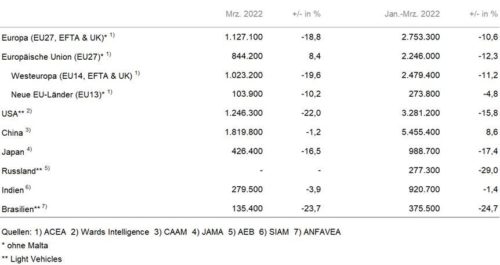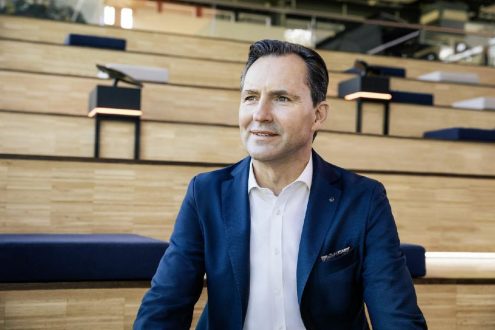A new level of puncture resistance thanks to Elastollan®
- Schwalbe and BASF jointly develop novel bicycle tube made entirely of Elastollan®
- Aerothan bicycle tubes from Schwalbe set new standards in production, puncture resistance and handling
- Bicycle tubes are 100 % recyclable
With the market launch of its new Aerothan bicycle tube on October 8, 2020, Schwalbe presents a new generation of bicycle tubes based on BASF’s thermoplastic polyurethane (TPU) Elastollan®. This innovation scores top marks in terms of weight, puncture resistance, handling characteristics, ease of assembly and packing size. Aerothan bicycle tubes are the result of unique developmental work between the market leader for bicycle tires and tubes in Europe and BASF’s Performance Material Division.
“In developing Aerothan bicycle tubes, we were breaking new ground right from the start,” says Felix Schäfermeier, Product Manager at Schwalbe. “The combined ingenuity and developmental work of BASF and Schwalbe has resulted in a high-end alternative to conventional bicycle tubes.”
The new Aerothan bicycle tubes are designed around a specially developed material combination based on BASF’s Elastollan®. The close cooperation is characterized above all by the targeted material development and tube prototype production at BASF’s Lemförde Technical Center, followed by tube assembly and intensive testing at Schwalbe. As a result, the optimum mix of materials and processing has been achieved, such that the new bicycle tube not only offers good performance, but is also around 40 % lighter than the established alternatives on the market. To achieve this, all parts of the new tube, including the valve stem, are made entirely of Elastollan®. The advantage of the reduced weight is not limited to just better handling, but is also evident in the smaller packing size, which makes the Aerothan tube an ideal backup tube.
Despite its low weight, the new tube offers cyclists a whole new level of puncture safety: the material prevents any sudden loss of air and ensures stable handling even at low tire pressure. Aerothan bicycle tubes are therefore approved for all rim brakes and so are perfectly suited to the high demands of racing bikes, mountain bikes or all-round cycling environments. Since Aerothan bicycle tubes can be changed quickly and easily without slipping or jamming, they are also easy to install in practice.
This is enabled by the special mechanical properties of TPU plastic. Elastollan® is highly resistant to abrasion and wear and is therefore extremely durable, even under sustained high pressure loads. At the same time, the material is extremely flexible, elastic and heat resistant.
“Elastollan® allows the use of thin walls, in order to reduce weight and at the same time produce a bicycle tube that offers significant advantages over butyl- or rubber-based bicycle tubes both in terms of puncture resistance and handling and on the manufacturing side,” explains Mark Ottens, Segment Manager Extrusion TPU at BASF.
Another advantage of the Aerothan bicycle tubes is their recyclability – they are made entirely of thermoplastic polyurethane. Like all Schwalbe tubes, Aerothan bicycle tubes can be returned to the manufacturer, easily and free of charge, via the tube recycling program. The material of the old tubes is processed and then reused as sealing or insulating material.
Further information:
Fakuma 2020: We are going virtual!
Register now online at fakuma.basf.com to chat with our experts, to experience interactive lectures and to explore the latest highlights on our virtual platform.
About BASF’s Performance Materials division
BASF’s Performance Materials division encompasses the entire materials’ know-how of BASF regarding innovative, customized plastics under one roof. Globally active in four major industry sectors – transportation, construction, industrial applications and consumer goods – the division has a strong portfolio of products and services combined with deep understanding of application-oriented system solutions. Key drivers of profitability and growth are our close collaboration with customers and a clear focus on solutions. Strong capabilities in R&D provide the basis to develop innovative products and applications. In 2019, the Performance Materials division achieved global sales of €6.06 bn. More information online: www.plastics.basf.com.
At BASF, we create chemistry for a sustainable future. We combine economic success with environmental protection and social responsibility. More than 117,000 employees in the BASF Group work on contributing to the success of our customers in nearly all sectors and almost every country in the world. Our portfolio is organized into six segments: Chemicals, Materials, Industrial Solutions, Surface Technologies, Nutrition & Care and Agricultural Solutions. BASF generated sales of €59 billion in 2019. BASF shares are traded on the stock exchange in Frankfurt (BAS) and as American Depositary Receipts (BASFY) in the U.S. Further information at www.basf.com.
BASF SE
Carl-Bosch-Straße 38
67056 Ludwigshafen
Telefon: +49 (621) 60-0
Telefax: +49 (621) 60-42525
http://www.basf-ag.de
Communications Performance Materials – Industrial
E-Mail: julia.endres@basf.com
![]()





